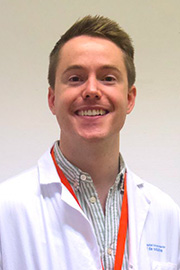
Rodrigo Sánchez-Bayona
Spain
ESMO: Tell us a bit about your career so far
Rodrigo: I did my Medical Degree in Universidad de Navarra (Pamplona, Spain) from 2008 to 2014. After that, I completed my Medical Oncology residency in Clínica Universidad de Navarra (2015-2020). During the fifth year of residency, I went to the MD Anderson Cancer Center in Houston (Texas) to take part in the Cancer Prevention & Survivorship Program. During the residency, I did my PhD in Breast Cancer Epidemiology. In 2020 I moved to Madrid to the Hospital Universitario 12 de Octubre, where I currently work as a specialist in breast & gynecological cancer.
What is your current activity?
I work as Medical Oncologist in the Breast & Gynaecological Cancer Unit in Hospital Universitario 12 de Octubre (Madrid, Spain). I combine my clinical activity with translational research in the laboratory as a post-doctoral researcher in the Spanish National Cancer Research Centre. My field of research is the role of circulating tumor cells in resistance to treatments in breast cancer patients. I am also member of the cooperative group SOLTI, a very active group involved in clinical and translational research.
What motivates you?
Every aspect of cancer that remains unsolved or poorly understood is a challenge for me. Curiosity is my main motivation. I think it is important to never lose the willing of learning something new. We do learn a lot from patients. Their problems represent a real challenge for us, and they need us to work hard in order to find proper solutions to these problems.
Why did you choose to become a medical oncologist?
I think Medical Oncology is, within other medical specialties, one of the most comprehensive disciplines. Medical oncologists must know about Biology, Pharmacology, Physiology, Genetics…and of course supportive care. Our specialty is so wide and complex that we really need to have motivated people on board.
What does your involvement with ESMO and the Young Oncologists Committee (YOC) mean to you?
For me it is a great opportunity to share with other young international colleagues my concerns about career development and educational opportunities. The way I consider ESMO is as a global society where we all can find our place as clinicians and scientists. It is very challenging to be able to really make a difference within our Society. I come from a very active country in terms of clinical and translational research, but I am aware that other colleagues find it hard to have access to these opportunities. As a global society, we must think big and create a network of young oncologists with common needs and motivations.
Do you have some good advice you would like to share with your international colleagues?
Never lose the willing of learning! This is what inspires us to try to do our best every day.
